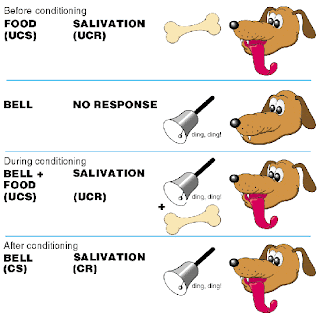Our Lecturer had taught us in Instructional Technology class that there are 3 learning theories. Firstly, it is behaviorism. Behaviorism means the person who study by having the stimulus, according to the response, then reinforcement. The reinforcements are including the reward and the punishment. The learners that using this theory like to keep repeating what they already learned so that they could master their study better. Other than that, they learn by the reward and punishment. If they do better, they love to having the reward, but they really hate the punishment. So, in order to avoid the punishment (especially from the teacher or parents if they fail in certain subjects) ,they will study harder. Therefore, 2 of the major players of this theory are Ivan Pavlov and B.f Skinner. They created and practiced this theory after finished their experiment. Ivan Pavlov's experiment that the most popular is classical conditioning by his dog.
 |
| Ivan Pavlov picture from:http://www.nobelprize.org/nobel_prizes/medicine/laureates/1904/pavlov-bio.html |
 |
| Ivan Pavlov's experiment on classical conditioning picture from:http://www.northern.ac.uk/NCMaterials/psychology/lifespan%20folder/Learningtheories.htm |
 |
| B.F Skinner picture from: http://www.cognitivedesignsolutions.com/Instruction/LearningTheory.htm |
 |
| B. F Skinner's experiment picture from:http://www.simplypsychology.org/operant-conditioning.html |
The second learning theory is cognitivism. Cognitivism means, people who study based on memorizing, problem solving, schemata, acquire knowledge, critical thinking, sequence and chunking. Talking about cognitive, of course it obviously related to the mind and brain. The major player of this theory is Piaget.
Lastly, it is constructivism. Meaning those who learned by the experiences, discover the knowledge, construct new ideas, collaborative and project based. 2 of he major players of this theory is Jerome Bruner and John Dewey .
 |
| John Dewey picture from:http://dewey.pragmatism.org/ |
References:
- Corey, Theory and Practice of Counseling and Psychotherapy, Eighth Edition, Thomson Brooks/Cole
- http://www.nobelprize.org/nobel_prizes/medicine/laureates/1904/pavlov-bio.html
- http://www.simplypsychology.org/operant-conditioning.html

No comments:
Post a Comment